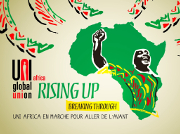Kenya Labour Minister opens UNI Africa's 3rd Regional Conference

Kenya’s Labour Minister opened UNI’s 3rd Africa Regional Conference by welcoming calls for all service sector workers to be organised into unions and to be protected by collective agreements.
The conference, one of Africa’s largest trade union gatherings, is being held in the Kenyan capital for the first time.
Speaking in front of a packed Kenyatta International Conference Centre, and representing President Uhuru Kenyatta, Minister Samuel Kambi said, “The government welcomes the idea of strengthening unions in the workplace to ensure all service employees are organised into strong unions and that they are protected by collective agreements.
Mr Kambi praised the work of UNI Africa and indicated that the government would adopt the best practices arising from the landmark union summit.
“Our goal continues to be promotion of opportunities for men and women to obtain decent and productive work in conditions of freedom, equity and human dignity. All of these are in line with your strategic priorities.
“As a government, we are committed to ensuring that some of the strategic priorities of UNI’s Breaking Through global strategy are taken into account in the formulation and implementation of our labour market policies and legislation.”
The first day was filled with prominent speakers from Africa’s trade union movement. UNI Africa President Bones Skulu welcomed delegates by evoking the spirit of former South African freedom fighter Nelson Mandela, insisting union members “must all strive to live a life of humanity, love, integrity, selflessness and sacrifice, be willing to serve without expecting anything in return, committed to unity, peace, and to make our country and the world a better place.”
Mr Skulu warned of a widening gap in equality across Africa and said the conference would serve as a “milestone in our struggles for decent work on the continent.”
In a rousing keynote address, UNI General Secretary Philip Jennings said that the signs of growth in Africa were positive and that much had been achieved since the last UNI Africa conference in Tunisia in 2009. But Jennings warned that there was a lot more to do to make good on Africa’s promise.
“Africa loses as much in illicit corrupt, illegal financial outfalls as it receives in international aid,” Jennings said. “This story of skimming the wealth of this continent simply has to stop or the promise we see in this continent won’t happen.”
The plight of women in the African workplace was a regular theme in the opening exchanges, and Louise Plaatjies, President of UNI Africa’s Women’s Committee, spoke passionately about UNI’s aim to give women a platform for equality.
“Women, like black keys on a piano, are needed to make the kind of melodies we want,” Plaatjies said, before quoting a popular African proverb in praise of the continent’s women.
“When you educate a man, you educate an individual, when you educate a woman, you educate a nation,” she said.
UNI Global Union President Joe de Bruyn echoed Plaatjies sentiments and praised African women for their strength and courage. “UNI Africa’s women are rising up. Without them, there can be no equality. Without the inclusion of youth there can be no equality.”
De Bruyn went on to outline “Including You,” UNI’s theme for its next World Congress taking place in Cape Town next year. “What do we mean when we talk of Including You? We mean human individual security. Decent work, fair pay, the right to join a union, collective bargaining and social protection.”
Francis Atwoli, General Secretary of COTU, Kenya’s confederation of trade unions called on Kenya’s leaders to fulfil their commitments to the country’s workers. He emphasized the importance of organising in the new economic landscape of East Africa. “Trade unions are a calling not a job. We must organise as one family,” Atwoli said.
In his concluding remarks, Philip Jennings pointed to a future in which most African jobs would come from the service sector, “We are the largest sectoral global union federation on this continent. We have a leadership role to play,” he said.
“Our movement belongs to us. The future is about the service workers. These days are important. We must double the number of trade unionists in our continent and we must double the number of global agreements.”
For all the latest on UNI Africa’s 3rd Regional Conference, visit the conference website.

